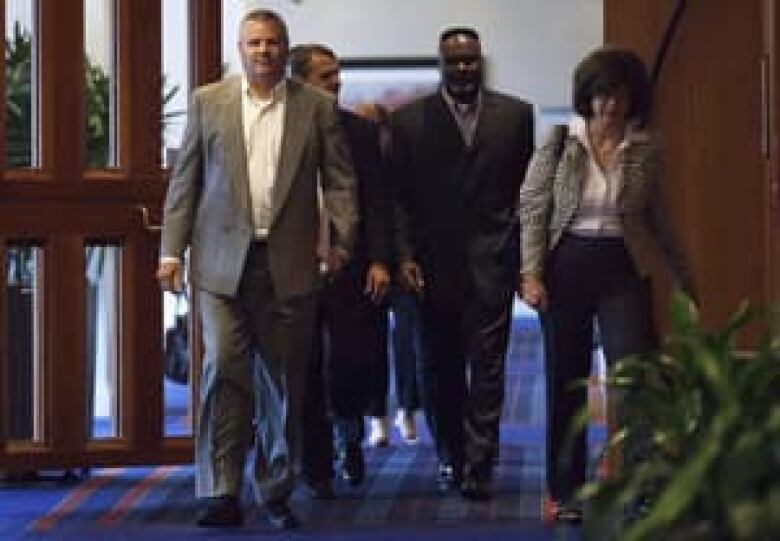Detroit 3 seeking concessions as deadline looms
CAW continues talks with GM, Chrysler and Ford

General Motors, Ford and Chrysler are pushing Canadian Auto Workers negotiators to agree to concessions as the clock ticks down to a possible strike or lockout at the end of today.
With talks continuing, now focussed on Ford, the issue seems to be how much less the workers will get in new three-year agreements.
The corporations, known as the Detroit Three"big" having faded from their old nickname are telling the CAW that they want to match labour costs in Canada with what they pay at their U.S. plants.
CAW Secretary-Treasurer Peter Kennedy, the number two official at the union, told CBC News that what the Detroit Three are asking for "has been the most aggressive set of demands that they've tabled, when they've been making money, and I've been at this over 20 years."
Chrysler, GM profitable 3 years after near bankruptcy

The last time the two sides were at the bargaining table was in 2009. It was a year into their existing contracts, but GM and Chrysler were facing bankruptcy. The CAW agreed to make concessions as part of a deal to get a government bailout for the two companies. Ford later benefited as well.
The three companies are now profitable. GM has had nine consecutive profitable quarters.
Kennedy described this round of bargaining as "the most frustrating and difficult" he's been involved in yet.
"Even more difficult than 2009 because we come into this with very modest expectations, and we have been met with very aggressive and hostile employers who are looking for even more than what we had to do when they were on the brink of bankruptcy."
The CAW's objective in this round of talks, Kennedy said, is to work out "how we share in the rewards without creating new fixed costs, and how we keep ourselves in the ballpark for investment."
At a media briefing ahead of the auto talks, the head of labour relations for GM Canada, David Wenner, said that "from a labour cost perspective, Canada's the most expensive place in the world to assemble a vehicle." He added that the cost is "somewhat offset by a health-care advantage in Canada."
Auto workers earn more in Canada than U.S.
Ford has said thatthe company'sall-in labour costswages and benefits, including pensions and health care, vacations, plant downtime and payroll taxes are $64 per hour in the U.S., but $79 per hour in Canada.

For its part, the CAW concedes the bill is higher in Canada. But the unionsays that "all-in labour costs for active CAW members at the auto companies in Canada currently average just under $60 (Cdn.) per hour," and put the difference at aboutfive per cent.
That means direct production labour represents just 4.2 per centof what the average vehicle sells for in Canada, according to the CAW.
The CAW is more concerned about total compensation for their members. They put the Detroit Three's total labour costs at an average of about $3 per hour more in Canada. "A CAW production worker at the top of the pay scale currently earns slightly over $34 per hour,"the union says.
CAW members at the Detroit Three
General Motors: 8,194 members
- Locations: Oshawa, Woodstock, St. Catherines, Ingersoll (the Cami plant in Ingersoll is not part of these negotiations)
Chrysler: 8,049 members
- Locations: Brampton, Windsor-Essex, Etobicoke
Ford: 4,534 members
- Locations: Windsor-Essex, Oakville, Bramalea
Total members, Detroit Three: 20,777
Source: CAW
The key reason for the cost difference: the U.S. dollar has fallen from about $1.61 Canadian in 2002 to about 97 cents on Friday.
According to the CAW, it takes an average of 29 hours of labour at the Detroit Three to build a vehicle, or $87 more than in the U.S. (That's not their only labour cost, of course, since vehicles have to be designed, distributed and sold.)
The union notes that the cost of living is also higher in Canada and even has a detailed study on their website comparing the prices for vehicles sold in Canada and the U.S. They find that the pre-tax price of a Detroit Three vehicle averages $1,293 more than in the U.S.
Kennedy said that the CAW is "looking for compensation for our members that wouldn't go into the base rates, it would be lump sum payments, to acknowledge their contribution to the success of the companies today."
That means those payments won't add to the companies' fixed costs, which Wenner had said was the focus for GM heading into the talks.
CAW resists two-tier wage structure

However, Wenner said the cost of new hires at their Canadian plants is uncompetitive and would be addressed at the talks. "This is critical because our demographics are such that we may have the opportunity to begin turning over the work force," he said.
The Detroit Three's collective agreements with the United Auto Workers in the U.S. include a permanent two-tier wage system for new hires. New employees start at about half the regular hourly rate.
Kennedy said that in the negotiations the CAW has said no a permanent two-tier structure. What the CAW has proposed, according to media reports, is a lower starting salary and extending the pay grid to ten years.
After wages, talks are about company issues
Once the two sides get beyond the wage issues, what remains, Kennedy said, are for the most part, company issues. "Any other proposals that we have on the table are to reinforce and maintain what already exists."
"We come into this with modest expectations, we're not proposing a whole host of new initiatives or even trying to claw back the sacrifices that were made in 2009," he added.
At the three sets of negotiations, the CAW says companies have been demanding the elimination of the existing cost of living adjustment, moving to a defined contribution pension plan from the existing defined benefit plan (a defined benefit plan sets the terms of the pension the employee will receive, while the payment in adefined contribution planis determined by the returns on how the pension contributions are invested), ending the practice whereby workers can retire on full pension after 30 years of employment, and reducing benefits.

Other company demands include greater flexibility on seniority and layoff and recall practices.
The trade-off for any concessions the CAW does make may be guarantees on investment in Canada, something the companies have agreed to in past negotiations. But Kennedy noted that, often, those investments have not materialized, "not necessarily because there wasn't the business case to do it, they just determined that they were going to do it somewhere else."
He pointed toGM closing its truck plant in Oshawa, which it announced three weeks after concluding the 2008 collective agreement and in violation of that agreement, the CAW claimed.
Next year GM plans to close its consolidated plant in Oshawa, while in Tennessee it's restarting production at the former Saturn assembly plant.
Since auto production peaked in Canada in 1999, the number of vehicles produced has fallen from 3.2 million to 2.1 million in 2011. The share of North American production fell from 17.4 to about 16 per cent.
Strike could be serious blow to Ontario economy
Investment by the Detroit Three is also a concern for the Ontario government, which says 485,000 of the province's jobs, directly and indirectly, depend on the auto sector.

Carlos Gomes, the chief economist at Scotiabank Economics, estimates that a month-long auto strike would cut Ontario's GDP by about 1.4 per cent.
Moody's Analytics chief economist Mark Hopkins reports that "even a one-week walkout could jeopardize Canada's increasingly listless growth."
Hopkins writes that the resurgence of the Detroit Three is driving a sharp acceleration in Ontario manufacturing. "Stalling this momentum, even temporarily, would be costly" for both the Canadian and U.S. economies.
The auto talks are taking place in "a new era of hard-nosed bargaining with unions, in the public and private sector," Alan Levy of Brandon University told CBC News.
Levy helped negotiate over 100 collective agreements on the management side, including at a Ford subsidiary, before becoming a mediator and turning to teaching labour relations and dispute resolution.
"Recently unions have been going through a very difficult period in dealing with employers, where employers are taking an old fashioned style of adversarial bargaining, rather than a collaborative approach," Levy said. .
With files from the Canadian Press and Reuters












_(720p).jpg)


 OFFICIAL HD MUSIC VIDEO.jpg)
.jpg)



























































































